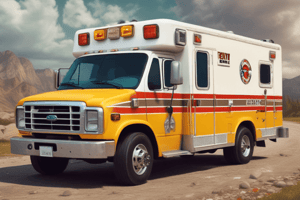Podcast
Questions and Answers
What is the maximum dosage frequency for administering Nebulized Salbutamol in a patient experiencing severe respiratory distress?
What is the maximum dosage frequency for administering Nebulized Salbutamol in a patient experiencing severe respiratory distress?
- Every 10 minutes, max 5 doses
- Every 15 minutes, max 2 doses
- Every 20 minutes, max 3 doses (correct)
- Every 30 minutes, max 4 doses
What is the recommended dosage for Methoxyflurane in patients who are aware and able to cooperate?
What is the recommended dosage for Methoxyflurane in patients who are aware and able to cooperate?
- 1ml
- 3ml (correct)
- 10ml
- 5ml
What is the maximum allowable dose for Paracetamol within a 24-hour period?
What is the maximum allowable dose for Paracetamol within a 24-hour period?
- 3g
- 4g (correct)
- 5g
- 6g
What is the recommended initial dose of epinephrine for anaphylaxis when administered intramuscularly?
What is the recommended initial dose of epinephrine for anaphylaxis when administered intramuscularly?
In the event of cardiac arrest, how often should the dose of amiodarone be repeated after the 5th shock?
In the event of cardiac arrest, how often should the dose of amiodarone be repeated after the 5th shock?
What is the appropriate route of administration for Fentanyl when treating severe traumatic pain as a second-line agent?
What is the appropriate route of administration for Fentanyl when treating severe traumatic pain as a second-line agent?
What is the maximum dose of atropine permitted for symptomatic bradycardia?
What is the maximum dose of atropine permitted for symptomatic bradycardia?
Under what condition should Heparin not be administered?
Under what condition should Heparin not be administered?
What should be added to the sodium chloride to achieve the correct concentration for post-ROSC administration of epinephrine?
What should be added to the sodium chloride to achieve the correct concentration for post-ROSC administration of epinephrine?
For local anesthesia during IV cannulation, what is the recommended dosage?
For local anesthesia during IV cannulation, what is the recommended dosage?
In what situation is the use of Intramuscular (IM) administration of a medication at 1mg/kg indicated?
In what situation is the use of Intramuscular (IM) administration of a medication at 1mg/kg indicated?
What is the required dose of glucose for hypoglycemia when not able to swallow?
What is the required dose of glucose for hypoglycemia when not able to swallow?
What is the maximum single dose of IV medication when treating pain with the combination of 400mcg in 10ml NaCl?
What is the maximum single dose of IV medication when treating pain with the combination of 400mcg in 10ml NaCl?
Which medication is indicated for acute cardiac pulmonary edema with a systolic BP greater than 90 mmHg?
Which medication is indicated for acute cardiac pulmonary edema with a systolic BP greater than 90 mmHg?
What is the max allowable dose of glucose gel for hypoglycemia?
What is the max allowable dose of glucose gel for hypoglycemia?
Which route of administration is used for treating moderate to severe pain in an adult with the recommended dose of 180 mcg?
Which route of administration is used for treating moderate to severe pain in an adult with the recommended dose of 180 mcg?
Flashcards are hidden until you start studying
Study Notes
Anaphylaxis and Life-Threatening Asthma
- Route: IM
- Dose: 0.5 mg (0.5 ml at 1:1,000)
- Repeat: Every 5 mins, no maximum dose.
Cardiac Arrest
- Medication: Adrenaline
- Route: IV/IO
- Initial Dose: 1 mg (1 ml at 1:1,000)
- Repeat: Every 3-5 mins (every second loop).
Post Return of Spontaneous Circulation (ROSC)
- Medication: Adrenaline (50 mcg)
- Route: IV
- Dose Preparation: Add 9 ml NaCl to make 1 mg/10 ml.
- Repeat: Every 3-5 mins to maintain systolic BP > 100 mmHg after 2 × 250 ml NaCl boluses.
Amiodarone for Cardiac Arrest
- Indication: Persistent/shock-resistant VF/pulseless VT after 3rd shock.
- Route: IV/IO
- Initial Dose: 300 mg (6 ml).
- Repeat: 150 mg after the 5th shock.
Aspirin
- Indication: Chest pain/discomfort of presumed cardiac origin.
- Route: PO
- Dose: 300 mg (1 tablet).
- Administration: Single dose.
Symptomatic Bradycardia
- Medication: Atropine
- Route: IV
- Dose: 0.6 mg (0.5 ml as neat).
- Repeat: Every 3-5 mins (max 3 mg).
Organophosphate Poisoning
- Route: IV
- Dose: 1-2 mg (10-20 ml), add 11 ml NaCl for dilution to make 1.2 mg/12 ml.
- Repeat: Every 5 mins until Atropinisation.
- Alternate Routes: IN (10 sprays max 10), PO/Topical (5 sprays max 5), IM (5-10 mg).
Moderate to Severe Pain Management
- Adult (IN): 180 mcg (3 x 0.2 ml); repeat 60 mcg after 5 mins.
- Small/Elderly/Frail (IN): 120 mcg (2 x 0.2 ml); repeat 60 mcg after 5 mins.
Glucagon
- Indication: Hypoglycemia (3rd line agent if IV access not available).
- Route: IM
- Dose: 1 mg (1 ml).
- Administration: Use Hypokit with 3 ml vanishing point; repeat once after 10 mins.
Glucose Administration
- Glucose 10% (IV): Treats hypoglycemia; initial dose 15 g (150 ml).
- Repeat: 5-10 mins, giving 10 g titrating to effect.
- Glucose Gel: PO, 15 g single tube, repeat once after 10 mins.
Glyceryl Trinitrate
- Indication: Acute cardiac pulmonary edema and autonomic dysreflexia.
- Route: SL
- Dose: 400 mcg (1 spray); repeat every 5 mins with no max.
Heparin
- Indication: Confirmed STEMI for CATH lab transport.
- Route: IV
- Single Dose: 5000 IU (5 ml).
Opioid Pain Management
- Nebulised Fentanyl: 500 mcg (2 ml); repeat every 20 mins (max 3 doses).
- IV Fentanyl: 5-20 mg titrated to effect (1-2 ml), max repeat every 5 mins.
- IM/Fentanyl: First line for severe trauma; 1 mg/kg (max 100 mg).
Sedatives/Behavioral Management
- IM Dose: 4 mg/kg (max 400 mg); for severely disturbed behavior.
- For Combative TBI: 2 mg/kg (max 200 mg).
Methoxyflurane
- Indication: Pain management contraindicated in severe renal impairment.
- Routes: IH (3 ml), IM (5 mg 1 ml), IV (2.5 mg 2.5 ml with NaCl).
Paracetamol
- Indication: Mild to moderate pain.
- Route: PO
- Dosage: 500-1000 mg (1-2 tablets); max dose 4 g in 24 hrs.
- Repeat: Every 4 hrs if needed.
Miscellaneous Route Options
- Inhaled/Nebulised Dosage Forms: Varying according to condition and age; ensure spacing and repeat guidelines are adhered to.
Studying That Suits You
Use AI to generate personalized quizzes and flashcards to suit your learning preferences.




